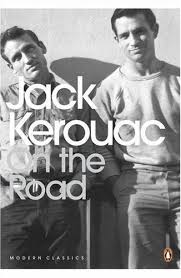Sal Paradise, a young innocent, joins his hero Dean Moriarty, a traveller and mystic, the living epitome of Beat, on a breathless, exuberant ride back and forth across the United States. Their hedonistic search for release or fulfilment through drink, sex, drugs and jazz becomes an exploration of personal freedom, a test of the limits of the American dream. A brilliant blend of fiction and autobiography, Jack Kerouac's exhilarating novel swings to the rhythms of 1950s underground America, racing towards the sunset with unforgettable exuberance, poignancy and autobiographical passion. One of the most influential and important novels of the 20th century, On the Road is the book that launched the Beat Generation and remains the bible of that literary movement.
 I was quite probably the least rebellious eighteen year-old when I first read Jack Kerouac's iconic On the Road. I was quite boring in a way I suppose - think awkward bob, no fake ID and a penchant for H&M v-neck jumpers. Things could only improve, that's all I can say... Anyway, at the time, On the Road (probably unknowingly) was quite an eye-opener to me. Its quality of writing, its strength of characters (perhaps helped by their autobiographical foundations) all made the book atmospheric to say the least; you really became part of this post-war generation and everything that came with it - the music, the excitement, the rebellion - even half a century later.
I was quite probably the least rebellious eighteen year-old when I first read Jack Kerouac's iconic On the Road. I was quite boring in a way I suppose - think awkward bob, no fake ID and a penchant for H&M v-neck jumpers. Things could only improve, that's all I can say... Anyway, at the time, On the Road (probably unknowingly) was quite an eye-opener to me. Its quality of writing, its strength of characters (perhaps helped by their autobiographical foundations) all made the book atmospheric to say the least; you really became part of this post-war generation and everything that came with it - the music, the excitement, the rebellion - even half a century later.
In an effort to get this across, there's no definitive, traditional plot. I guess I found that a little problematic from time to time but my main problem was that it was all so blokey. Lots of naked men giving each other man hugs, shagging as many women as possible while trying to maintain an authoritative intellectual status by introducing oneself as part of that elusive profession: 'a writer'. Nevertheless, I could still see its appeal, much more than, say, Conrad's Heart of Darkness which I had just struggled through reluctantly for A-level.
It's the kind of book you can imagine the previous generation - one that had just lived through the horrors of World War Two - would have wanted to burn. On the Road presents a new world, a new generation: the Beat generation, which showed young people with no responsibilities, a lot of drugs and very high sex drives all listening to jazz and rock n' roll. At the time, a review from Time magazine read:
The post-World War II generation—beat or beatific—has not found symbolic spokesmen with anywhere near the talents of Fitzgerald, Hemingway, or Nathaniel West. In this novel, talented Author Kerouac, 35, does not join that literary league, either, but at least suggests that his generation is not silent. With his barbaric yawp of a book, Kerouac commands attention as a kind of literary James Dean.
Despite appreciating it for these reasons, I didn't fall in love with this book. Oddly this reaction made me really excited for the film. As I've said before, it's a lot easier for me to enjoy a film if I distance it from the book, especially if its a book I loved. The film, for me, was able to bring to life the colour and sound of the age, altogether with a fantastic cast that all stepped up to the mark. Yorkshire boy Sam Riley took on Sal Paradise, Garrett Hedlund nailed the role of Dean Moriarty and Kristen Stewart proved yet again that she is not just masochistic vampire-lover Bella Swan but a competent actress. Equally, Tom Sturridge put in a fantastic performance, as did the legendary Viggo Mortensen, Kirsten Dunst, Amy Adams and Brit Danny Morgan.
Walking out of the cinema, despite all the dramas, I surprised myself by wanting more than ever to go on a road trip. In the book I think I was safely distanced from it but here I wanted nothing more than to jump in a car, put on some Slim Gaillard, and let my K-Stew-esque sun-kissed hair blow out the window.
All in all, I think perhaps we should all read On the Road even if only to have said we've read it and to at least try and understand the era it puts on display for us. Overall, though, I probably preferred the film. It's definitely got that 'indie' feel to it, though, in the way that it doesn't make it immediately easy to get into; you have to be patient but you'll eventually become completely involved in Kerouac's era and his characters. In fact that's probably my final comment... I am always impressed by a film or book that is able to make you feel for characters that are in so many ways, if not all, completely unsympathetic. Dean is one of those addictive personalities that you kind of resent because everyone falls for him even though his inherently irresponsible and causes problems everywhere he goes. But you do want to see him do well all the same - perhaps because he's not deliberately evil or mean and that's what really matters isn't it?
The film gets 8/10 - the book gets 6/10




